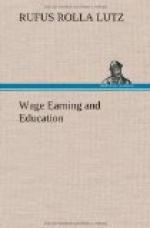In view of the fact that many of the workers are foreigners or of foreign parentage, and that the frequent changes in styles and materials require the giving of detailed instructions by foremen, instruction in English is of more importance in the garment trades than in occupations where there is a larger proportion of native born and where the products and processes are more uniformly standardized.
All clothing workers should have a practical knowledge of the fundamental operations of arithmetic. Where the piece and section systems are in operation it is important for the worker to keep account of what she has accomplished and to know enough arithmetic to check her own record with the tally kept by the foreman or payroll girl. Some of the occupations, such as cutting, involve a considerable amount of arithmetical computation.
As in other trades, all workers and prospective workers need a general knowledge of industrial conditions. They would greatly benefit from a better understanding of the supply of labor, factors affecting prices, organization of workers, industrial legislation, the relative importance of the field of employment in different industries, the nature of important industrial processes, and the like. At the present time there is little opportunity for gaining such information either before entering any specific line of work or afterwards.
For certain small groups within the clothing industry there are needs in the way of technical training that are important and at present unsupplied. Training in applied mathematics, drafting and design would be of benefit to a considerable number of employees who are occupying or working towards advanced positions.
A large proportion of the women workers need skill in hand sewing. Before girls enter the industry they should have careful and systematic training in plain sewing stitches, sewing on buttons and other fasteners, and button hole making.
Machine operating is the most important occupation in the industry, and employs more women than any other occupation in the city, except perhaps dressmaking. After a careful study of the characteristics of this occupation and the various conditions affecting it, the survey reached the conclusion that there should be established by the school system a trade course for prospective power machine operators.
SEWING COURSES IN THE PUBLIC SCHOOLS
In the elementary schools manual training sewing is given in the fifth and sixth grades. It consists of one hour a week of hand sewing taught by a regular grade teacher or sometimes by teachers of domestic science or other special subjects. The aim is to give the girls a knowledge of practical sewing which may be of use to them in the home. In five of the elementary schools hand and machine sewing is taught by special sewing teachers. About four per cent of all the seventh and eighth grade girls




